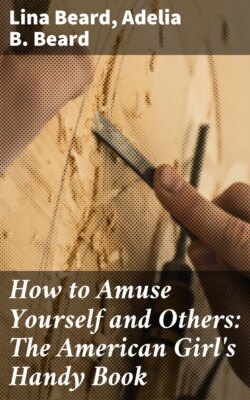Читать книгу How to Amuse Yourself and Others: The American Girl's Handy Book - Adelia B. Beard - Страница 31
На сайте Литреса книга снята с продажи.
Easter Egg Games.
ОглавлениеTable of Contents
In the game they play at Washington, on the hills sloping from the White House, the child whose egg reaches the foot of the hill in an unbroken condition takes the one worsted in the journey down. Another game for two is played by knocking the eggs together; each child holds an egg firmly in his hand so that only the small end is visible, and then the two eggs are struck against each other until one is cracked, when the victorious player adds it to his stock, or devours it on the spot. I would not like to state the number of eggs eaten on these occasions, but there is a boy (not a girl) who once consumed fourteen and lived to tell the tale.
Sometimes the egg which breaks another is called “the cock of one,” and when it has broken two it is “cock of two,” and so on. When an egg which is cock of one or more is broken, the number of trophies won by the victim is added to the score of the conquering egg and it becomes “cock of three” or more. Here is a game which comes from Germany, and although in that country it is played exclusively by boys, there is no reason why the girls should not participate in it as well. Two baskets are necessary for this game, one large and shallow filled with soft shavings, the other shallow also, but smaller, and filled with eggs. The plan of the game is that one player is to run a given distance, while another safely throws the eggs from one basket to the other, she who completes her task first being the winner. When the baskets are prepared, and the distance the eggs are to be thrown decided upon, the two contestants draw lots to determine who shall run and who shall throw. This settled, the player who throws takes the basket of eggs, and one after another quickly tosses them the length of the course and into the basket of shavings, which is placed on the ground at the end of the course opposite the thrower. In Germany this basket is held by an assistant, but anyone occupying that position might receive some severe blows from the hard eggs thrown by unpractised hands, and it answers the purpose just as well to place the basket on the ground. Meantime the other player runs the distance (decided beforehand) to an appointed goal, marks it as a proof of having touched it, and should she succeed in returning before all the eggs are thrown, the victory and prize are her reward; otherwise they belong to the thrower.
The game finished, a prize is presented to the successful contestant. Should any of the eggs pitched by the thrower fail to light in the basket, they must be gathered up and thrown again before the runner returns, as the eggs must all be in the basket before the thrower wins the game.
“Bunching eggs” comes from Ireland, and is played in very much the same manner as the game played with a slate and pencil, and known to all children as “tit, tat, toe, three in a row.” A pan or large dish filled with sand or sawdust is set upon a table, around which the children stand, each supplied with eggs; the eggs of each player must be all of one color, and unlike those of any other player. The object of the game is for each player to so place her eggs, standing them upright in the sand, or sawdust, as to bring five in a row touching each other.
In turn each player puts down an egg, sometimes filling out a row for herself, at others cutting off the line of an opponent; and the one who first succeeds in obtaining the desired row sings out—
“The raven, chough, and crow,
Say five in a row.”
Another pretty game from Ireland called “Touch” is played in the following manner:
Six eggs of the different colors—green, red, black, blue, white, and gold are placed in a row in the sand used for the other game. One of the players is blindfolded and given a light wand or stick, with which she must touch one of the eggs, while at the same time she recites these lines:
Peggy, Patrick, Mike, and Meg,
See me touch my Easter egg;
Green, and red, and black, and blue,
Count for six, five, four, and two.
If I touch an egg of white,
A forfeit then will be your right;
If I touch an egg of gold,
It is mine to have and hold.
As is told in the rhyme, the eggs each have a different value. Green counts six; red, five; black, four; and blue, two; and the gold egg is worth more than all put together, for when a player touches that, she wins the game and a forfeit of an egg from each of the other players. The white egg is worth less than nothing, since it not only has no value but whoever touches it with the wand must pay a forfeit.
Each player is in turn blindfolded and makes her trial, keeping account of the value of the eggs she has touched. When the sum of twenty has been reached by anyone the game is ended, without the aid of the gold egg. The position of the eggs are changed after each trial, that the person about to touch them may not know where it is best to place her wand.
